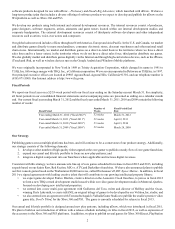THQ 2011 Annual Report Download - page 21
Download and view the complete annual report
Please find page 21 of the 2011 THQ annual report below. You can navigate through the pages in the report by either clicking on the pages listed below, or by using the keyword search tool below to find specific information within the annual report.period product net sales. While we believe that we can reliably estimate future returns and price protection, if product sell-through
does not perform in line with our current expectations, return rates and price protection could exceed our reserves, and our net
sales could be negatively impacted in future periods.
Our platform licensors control the fee structures for online distribution of our games on their platforms.
Certain platform licensors have retained the right to change the fee structures for online distribution of both paid content
and free content (including patches and corrections) on their platforms. Each licensor's ability to set royalty rates makes it difficult
for us to forecast our costs. Increased costs could negatively impact our operating margins. We may be unable to distribute our
content in a cost-effective or profitable manner through this distribution channel, which could adversely impact our results of
operations.
Development of software by platform manufacturers may lead to reduced sales of our products.
The platform manufacturers, Microsoft, Nintendo and Sony, each develop software for their own hardware platforms.
As a result of their commanding positions in the industry, the platform manufacturers may have better bargaining positions with
respect to retail pricing, shelf space and retailer accommodations than do any of their licensees, including us. Additionally, the
platform manufacturers can bundle their software with their hardware, creating less demand for individual sales of our products.
In the twelve month period ended March 31, 2011, Nintendo's market share in the U.S. was nearly 34% on its Wii platform and
more than 37% on its DS platforms. Continued or increased dominance of software sales by the platform manufacturers may lead
to reduced sales of our products and thus lower net sales.
Increased development of software and online games by intellectual property owners and developers may lead to reduced net
sales.
Some of our games are based upon licensed intellectual properties. In recent years, licensors and independent developers
have increased their development of video games in digital and other online distribution channels, which could lead to such
licensors not renewing our licenses to publish games based upon their properties that we currently publish, or not granting future
licenses to us to develop games based on their other properties. If intellectual property owners continue expanding internal efforts
to develop video games based upon properties that they own rather than renewing our licenses or granting us additional licenses,
our net sales could be significantly impacted.
Competitive launches may negatively impact the sales of our games.
We compete for consumer dollars with several other video game publishers, and consumers must make choices among
available games. If we make our games available for sale at the same time as our competitors' games become available, consumers
may choose to spend their money on products published by our competitors rather than our products and retailers may choose to
give more shelf space to our competitors' products, leaving less space to sell our products. Since the life cycle of a game is short,
strong sales of our competitors' games could negatively impact the sales of our games.
Competition for licenses may negatively impact our profitability.
Some of our competitors have greater name recognition among consumers and licensors of properties, a broader product
line, or greater financial, marketing and other resources than we do. Accordingly, these competitors may be able to market their
products more effectively or make larger offers or guarantees in connection with the acquisition of licensed properties. As
competition for popular properties increases, our cost of acquiring licenses for such properties may increase, which could result
in reduced margins and thus negatively impact our profitability.
Competition with other forms of home-based entertainment may reduce sales of our products.
We also compete with other forms of entertainment and leisure activities. For example, we believe the overall growth
in the use of the Internet and online services, including social networking, by consumers may pose a competitive threat if customers
and potential customers spend less of their available time using our video games and more of their time using the Internet, including
playing social networking games on Facebook, and online services.
Competition for qualified personnel is intense in the interactive entertainment software industry and failure to hire and retain
qualified personnel could seriously harm our business.
To a substantial extent, we rely on the management, marketing, sales, technical and software development skills of a
12
























